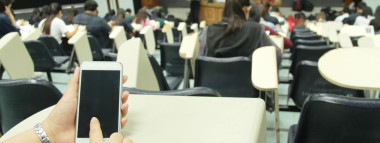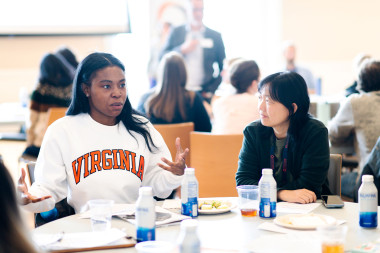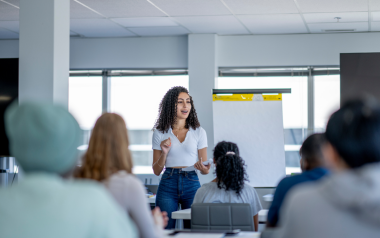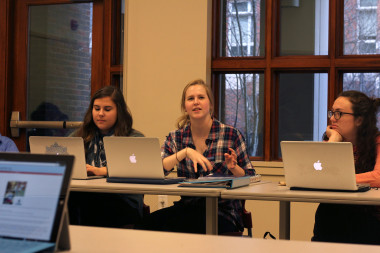Collections
Expertly curated content on a wide range of pedagogically focused topics

Frameworks and Activities for Fostering AI Literacy
This collection features frameworks for understanding AI literacy—including one framework developed here at UVA—as well as classroom activities that support the development of AI literacy in both students and instructors.

In-Class Polling for Student Engagement
Instead of asking our students "Any questions?" and hoping for a response, we can use polling technologies to enable and invite all of our students to share their questions and respond to ours. The resources in this collection will help you use these technologies intentionally for student learning.

Teaching as Inquiry, Not Advocacy
A professor is not a politician or a preacher. An instructor may know that their teaching is rooted in academic inquiry, not advocacy, but how can they make this clear to students and others? These resources help instructors answer this question and establish themselves as honest brokers.

Why Pedagogical Partnerships Matter
In pedagogical partnerships, students and teachers contribute collaboratively “to curricular or pedagogical conceptualization, decision-making, implementation, investigation, or analysis” (Cook-Sather et al., 2014). This collection explores the question: Why do pedagogical partnerships matter?

Compassionate Online Course Design
Discover how compassionate online course design can help you put flexibility, peer support, and motivation at the heart of the online learning experience.

Standards-Based Grading
These resources provide an introduction to Standards-Based Grading, an alternative grading philosophy in which students' grades are based primarily on the number of content standards they demonstrate mastery of at any point in the term.

Leveraging WordPress for Student ePortfolios, Blogs, and Websites
This collection considers the research on and reasons for having students create ePortfolios, blogs, or websites. It also features guidance on using WordPress at UVA, including instructions for integrating the tool into UVACanvas.

Reciprocal Peer Teaching Observations
Peer observation of teaching need not happen only as part of faculty evaluation processes. Observing each others' classes with the purpose of reflecting and providing feedback to one another benefits instructional quality as well as collegial connection.

Emotions and Learning
We often think of learning as a purely cognitive activity, one characterized by cold intellect and impartiality. This collection offers a counterpoint, presenting theoretical grounding, data, and practical suggestions for centering emotional and motivational aspects of teaching and learning.

Teaching for Democratic Engagement and Civic Learning
Across the disciplines, instructors can support students’ development as citizens and voters. These resources explore ways to incorporate this work in your courses, design engaging activities for civic skills building, and prepare for high-stakes discussions in polarized times.

Getting Started as a Graduate Student Teacher
First time teaching your own course? In this collection, you'll find foundational resources to begin your teaching journey. Each resource is from my own bookshelf that I use over and over again!

Holistic Approaches to Learning Objectives
Do you find that your course learning objectives don't fully capture the goals you and your students have for their learning and development? This collection points to a variety of frameworks for developing more holistic learning, where the humanity of our students is at the center.

Assessment as Learning
How can we transform assessment from a summative event to one that actively engages students in learning? This collection explores approaches to assessment that foster self-regulation, reflection, and evaluative judgment, and that support students in becoming life-long learners.

Improving Students' Feedback Literacy
When students receive feedback on their work, what do they do with it? Feedback literacy encompasses the knowledge, skills, and attitudes that students need to appreciate the value of feedback, engage in feedback processes, and take responsibility for their own learning and development.

Integrating AI into Assignments to Support Student Learning
What role might generative AI play in helping students meet the learning goals we have for them? This collection features concrete examples of assignments that thoughtfully integrate AI to support student learning.

How Can AI Support Accessibility and Universal Design for Learning (UDL)?
This collection introduces you to resources when beginning or scaling-up your use of artificial intelligence (AI) in ways which strengthen or enhance accessibility or opportunities for universal design for learning (UDL).

Exploring and Defining an Educator's Scope of Practice
It can be challenging to manage all the responsibilities associated with teaching, advising students, and engaging in research and service to your department, college, or discipline. Reflecting on your scope of practice can help you clarify your roles and boundaries to help you thrive.

Incorporating Metacognition into Teaching
Metacognition—awareness of one's own thought processes—isn't just important for students! These resources introduce you to strategies for incorporating metacognitive awareness into your own teaching in order to become more conscious of students' needs and more responsive in your lesson planning.

An Introduction to Contemplative Pedagogy
This collection is for instructors from all fields—often inspired by their own contemplative practice—who are looking for ways to engage students more wholistically and develop their capacity for awareness, concentration, and insight.

Teaching Portfolios
A teaching portfolio is a curated set of materials paired with reflective statements that represents your teaching practices and your development as a teacher. This collection advises you on how to select materials and how to organize them into a compelling narrative about your teaching.

















